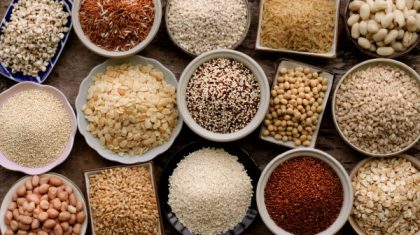People with diabetes are typically advised by their doctors to closely monitor their carbohydrate intake to avoid high sugar levels. But cutting back on carbs does not mean quitting them altogether. In fact, some grains may be beneficial for people with diabetes.

Consult with Diabetes Experts Now
Baisakhi, the first day of the Vaisakh month, is customarily observed every year on the 14th of April. In Northern India specifically, it is seen as a celebration of the spring harvest. For farmers, Baisakhi is a significant occasion since it honours the Rabi season’s crop. Let us commemorate this festive occasion and know which grains are suitable for people with diabetes.
If you include whole grains in your diabetes diet, you have a good chance of regulating your blood sugar levels. As whole grains take longer to digest, carbohydrates are released into the blood more gradually as a result.
Grains That Do Not Cause Blood Sugar Levels to Rise
Brown rice is a superior choice because it is a whole grain with more fiber than white rice and a lower glycemic index. Farro and barley are further whole-grain alternatives to white rice. Although whole grains should always be chosen above processed ones, they shouldn’t be consumed in excess.
Whole grains help lower cholesterol levels, reducing the risk of developing heart disease. The digestion and absorption of carbohydrates are slowed down by whole grains. This gradually causes blood sugar levels to rise more slowly. Also, eating more whole grains may make you feel fuller for longer.
Grains Suitable for People With Diabetes
People with diabetes can benefit from eating in moderation and choosing higher fiber carbohydrate options. Fiber reduces the rate of insulin spiking after meals.
- Brown rice
Brown rice is a strong source of magnesium and has a medium GL of 16. Magnesium is an excellent choice for anyone managing diabetes because it helps control blood pressure, blood sugar levels, and muscle and nerve function. - Jowar
Jowar, high in vitamin K1, is important for bone development and blood coagulation. Jowar’s bioactive phenolic components help in lowering harmful cholesterol. Extremely resistant starch complexes help control weight by promoting fullness and helping in blood glucose maintenance. - Bajra
This grain is high in fiber and has a low glycemic index, making it beneficial for people with diabetes. Moreover, it promotes weight loss and treats constipation. - Farro
This classic grain tastes nutty and resembles brown rice in appearance. It is packed with vitamins and minerals, such as magnesium, iron, and fiber. Iron promotes the body’s production of hemoglobin, which carries oxygen to every cell in the body and encourages growth and development. - Barley
Beta-glucan-rich barley is beneficial for controlling blood sugar levels and decreasing bad cholesterol. - Ragi
Ragi, which resembles mustard in appearance, is a nutritious millet that benefits those with high blood sugar levels and lowers high cholesterol levels. - Oat bran
Oat bran is high in protein, magnesium, soluble fiber and other nutrients. These ingredients greatly aid blood glucose regulation, making them suitable for a person with diabetes. - Quinoa
One cannot overlook quinoa, a nutritious whole grain for diabetes. It is not only nourishing but also high in fiber and protein. It helps in appetite management and can keep you committed to a diet rich in healthy calories.
If you want to learn how to manage your diabetes at home with food and exercise, get a diabetes doctor and a personalized diabetes diet plan. Follow all the recommendations given by your health coach if you wish to keep your sugar levels within the controlled range. Also, do not forget to monitor your sugar levels on a regular basis.





Very informative